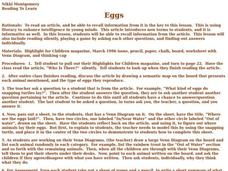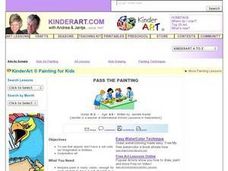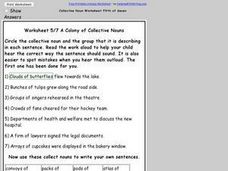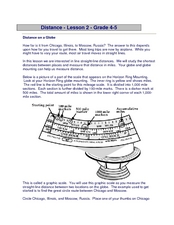Curated OER
Literature Circles
Students view a PowerPoint presentation in order to show the five jobs involved in a literature circle. The literature circle is to be used in the class for the reading of novels. A graphic organizer is also used to increase comprehension.
Curated OER
Eggs
Help your students practice reading an article to improve their literary skills with new terms and summarizing information. They read silently and then play a game by asking each other questions and finding out answers individually. A...
Curated OER
Spots the Barn Cat: Finding the Main Idea
Spots the barn cat is the subject of this colorful worksheet. Young learners demonstrate their ability to identify the main idea in a written passage by reading a short passage about Spots and responding to the prompt asking them to...
Curated OER
SSR Teacher/Student-Run Conferences
Looking for a simple way to connect with each of your pupils about a book they've read? While the rest of your class is engaged in SSR, each learner comes to you for a one-on-one session. Great for formative assessment or just a good...
Curated OER
Rainbow Fish Drawing
First graders read the book, RAINBOW FISH and view a few pictures of different types of fish. They discuss putting certain shapes together make up objects and talk about and demonstrate straight and wavy lines, thick and thin lines....
Curated OER
The Tell-Tale Heart
Bring Edgar Allan Poe's spooky story to life! After reading the short story "The Tell-Tale Heart," middle and high schoolers identify the theme, character traits, irony, and other story concepts. During pre-reading, they take notes,...
Curated OER
Literature and Telecommunications
Students read a novel and write short journal entries about the characters, setting and interesting facts. Using email, they share their responses to the novel with other students at a different school. Student also create slide shows...
Curated OER
Pass the Painting
After reading a story or informational text describing an animal, your class gets creative and collaborative with paint. In groups, they brainstorm all the parts of an animal, they then take turns painting those parts. One child starts...
Curated OER
Worksheet 5/7 A Colony of Collective Nouns
Practice identifying and using collective nouns with this resource. For this activity, pupils circle the collective noun and the group that it describes in each sentence. They then use the collective nouns to write their own sentences....
Curated OER
Comparing and Contrasting Heroes
Here is a language arts lesson that can be used with virtually any grade level. The only thing that changes is the reading level of the books. Learners compare and contrast different heroes and the characteristics they hold. They use a...
Curated OER
Game Applauding Differences
Pupils cheer wildly for each other as they explore things they have in common and things that make them different. They sit in a circle and clap and cheer as enthusiastically as possible. Students keep an eye on the teacher, so that they...
Curated OER
Distance on a Globe
In this world globe worksheet, students read a detailed one page text about how to measure distance on a globe. Students answer 5 questions that will require a globe.
Curated OER
The Leprechaun's Treasure
Here is a good parts of sentences worksheet that uses leprechauns! Young writers read sentences about a leprechaun's treasure and then circle the predicates, underline the subjects, and double underline the phrases. They do this for 20...
Curated OER
I Love Spiders
Students complete an integrated unit on spiders. They explore about spiders. Students read a book entitled I Love Spiders by John Parker. They incorporate Spider art, Edible Spiders, the making of a Spiderweb Room and Spider poems.
Curated OER
Geo Shapes
First graders listen as the book, "Try It With Triangles" is read to the class. They name the geometric shapes that they see in the story and view the Shape Vocabulary Cards as they name them from the book. They then cut out the...
Curated OER
Worksheet 7/7 A Pride of Collective Nouns
Play around with collective nouns! For this activity, learners read and study a story about a band of thieves coming to an island. Readers look for the collective noun groups in the story and circle all 40 of them. This exercise includes...
Curated OER
Implied Main Idea
Reinforce main idea and supporting details with your seventh graders in this language arts lesson. Using a SMART board presentation and handouts (all attachments are provided), they review and practice finding main idea and details in...
Curated OER
Plotting a Hurricane Using Latitude and Longitude
Learners define and use "absolute location," latitude, and longitude. They locate on a map or globe the Earth's poles, circles, tropics, and beginning points of measurements for latitude and longitude.
Curated OER
Cruise the News
Students utilize newspapers as a resource to complete various tasks. They read articles, write summaries, investigate the classified section, write commercials, and circle spelling words.
Curated OER
Words and Pictures
Let's match words and pictures! In this word and picture matching activity, young readers analyze eight pictures in a box with a common theme. They read a short story and circle all the words that match the pictures.
Curated OER
Zebras
In this proof reading worksheet, 3rd graders read five sentences about zebras. They identify the ten errors in the sentences. Errors include capitalization, punctuation, spelling and grammar.
Curated OER
Present Tense Subject/Verb Agreement
In this grammar agreement activity, students read 10 sentences and circle the appropriate verb form in parentheses that completes each sentence grammatically correct.
Curated OER
Getting to Know You
Need a first day ice breaker? Try this getting to know you exercise. Pupils stand in a circle and introduce themselves. The trick is they add an adjective that describes them and starts with the same letter as their first name. Add a...
Curated OER
Day Ten Lesson- The Whale Rider
Readers respond to Chapters 17 and 18 of Whale Rider by Witi Ihimaera. Working in literature groups, they identify the climactic elements in the chapters, discussing the text and making inferences based on their reading.

























